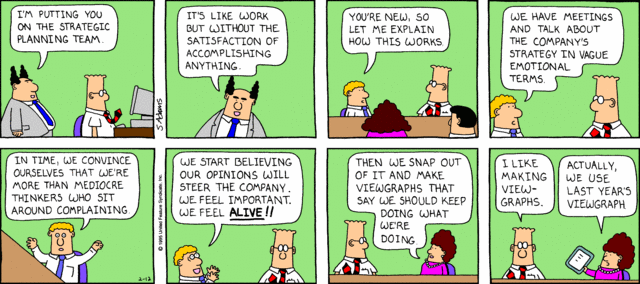The Department of Why
 One of my graduate school professors in discussions emphasized asking "why" around five times for every question in an effort to get well below the surface level of the topic. I rather like the concept. Peter Drucker has volumes of quotes but in particular (paraphrased): "We don't fail from making bad decisions, we fail because we asked the wrong questions."
One of my graduate school professors in discussions emphasized asking "why" around five times for every question in an effort to get well below the surface level of the topic. I rather like the concept. Peter Drucker has volumes of quotes but in particular (paraphrased): "We don't fail from making bad decisions, we fail because we asked the wrong questions."It's hard for me to avoid Daniel Pink because his work has so much potential impact on our organizations, or at least it should, but in the Flip-Manifesto rule number 11 is establishing a Department of Why? We become so entwined in the habits of both ourselves and our organizations that rarely do we make time to step away and ask "Why are we doing this?".
Margaret Wheatley in a 2006 presentation in Halifax called "A Call to Fearlessness for Gentle Leaders," asked these key questions:
- How do you call yourself? How do you identify yourself? And have you chosen a name for yourself that is big enough to hold your life's work?
- What's so bad about fear?
- Does the world need us to be fearless?
- What if we can't save the world?
- What is it like to live in the future now?
- Why do we imprison ourselves? Why are we so afraid?
- Can we work beyond hope and fear?
- What would it take for us to just deal with what is? To not need to be always engaged in changing the world?
I really like this excerpt from Margaret's bio:
Amen. Now more than ever in our evolving global economy the ability to synthesize multiple disciplines is required for the level of innovation we need to seize opportunities for positive change. Why else are we here with such a limited time frame with which to act?"I have always found my attention drawn to many different disciplines: science, history, literature, systems thinking, organizational behavior, social policy, cosmology and theology. I value what I’ve learned from each of these different fields, because no one discipline, institution, or specialization can answer the questions that now confront us. We all must draw from many different perspectives to reweave the world."
Turning to One Another (2002)




Comments
Post a Comment
Thank you for sharing your worldview.